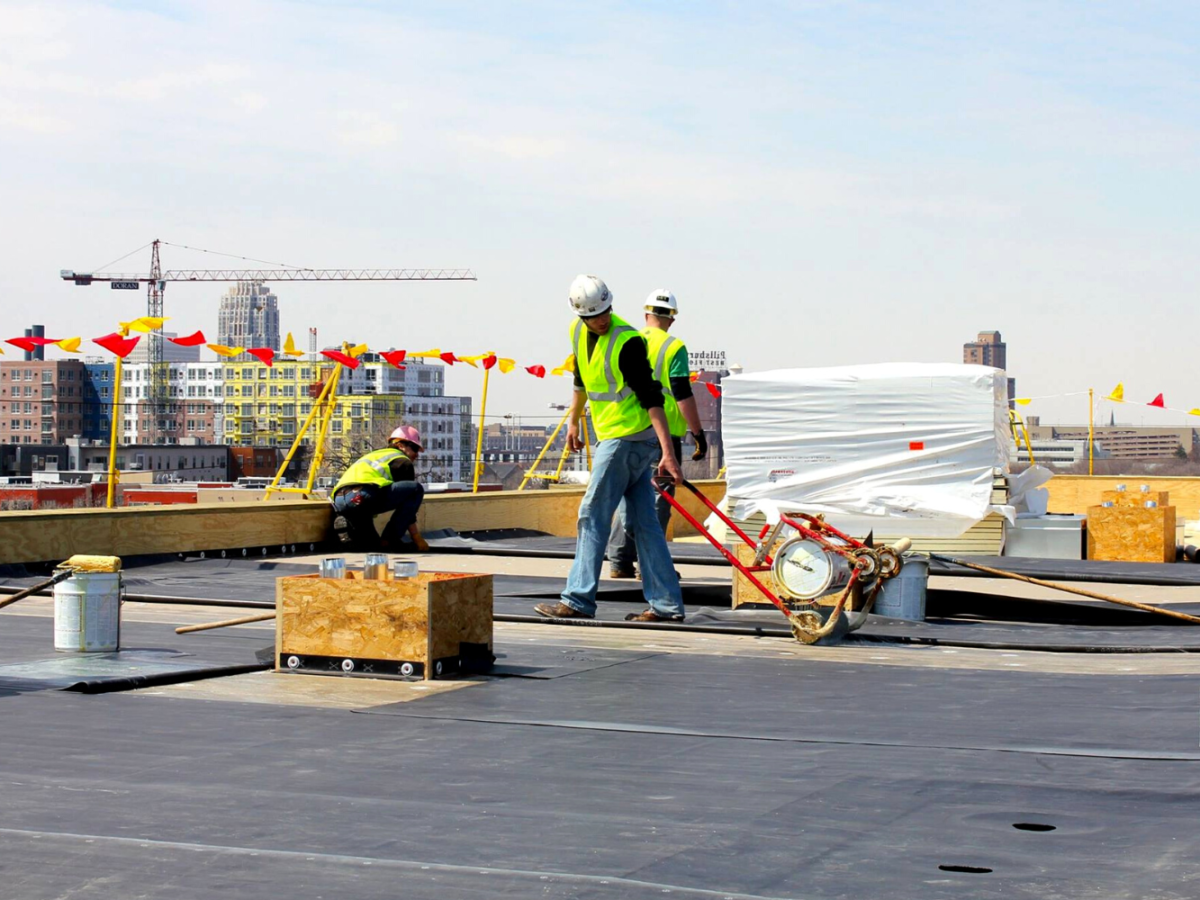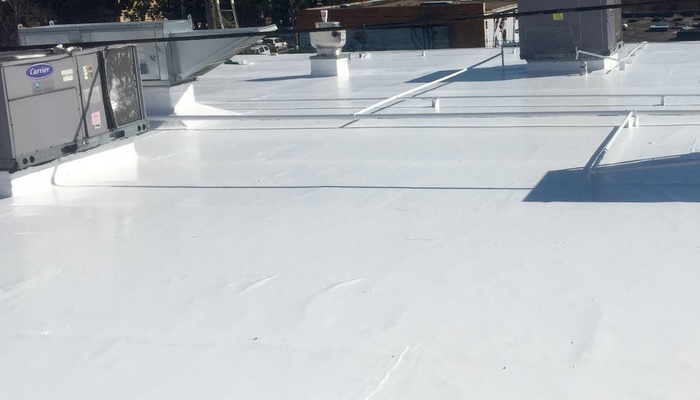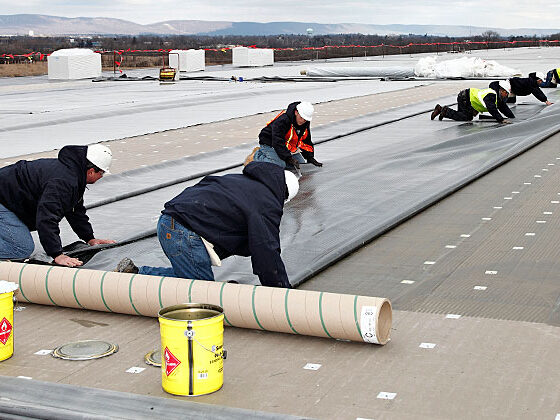Even if you take all the necessary precautions and keep up with maintenance, roofs do not last forever. Extreme weather damages the structure of the roof, leading to leaks, mold and a host of other issues. The simple truth is that roofs will need replacing and repairing to keep them in tip-top shape.
If you’re a property owner wanting to rent or sell your space, taking the time to invest in a new roof will increase the property value. It will also better protect the interior of the building and add to the overall appeal of the structure. For business owners, you will want to ensure that you have a functioning roof to protect your products and patrons from the elements. You don’t want a leaking roof to damage your belongings.
Who is Responsible for Replacing the Roof?
Replacing and repairing a roof takes a lot of time and planning. If you notice signs of damage, you should have a contractor fix the roof as soon as possible. However, the person responsible for replacing the roof is a little more involved. In most scenarios, businesses do not own the building they sell out of. Instead, they rent from a third-party individual. This third party and the business will have signed a contract, agreeing to the terms of the lease.
Before you make the call to replace the roof, you should first check the contract to see who is responsible for the repairs. In many situations, the landlord is the one responsible. As a landlord, it is their duty and responsibility to ensure that the building remains functioning. Keep in mind that if the business is directly responsible for the damages, then they are often the ones liable.
If the contract does not say explicitly, you can check your state’s renting policies. They will usually have information that states the landlord is responsible.
Always take the time to do your research so you’re not paying for the repairs. If you are a renter, don’t let the state of the roof deteriorate further before informing the landlord of the situation. You want to keep your establishment free from damages.

Six Signs You Should Replace Your Roof
Regardless of which party is responsible, the main issue is knowing when exactly you should replace your roof. You have several different factors to consider when deciding to replace your roof. If you find yourself unsure of the quality of your roof and whether it needs to be replaced, here are six signs that you should replace your roof.
- Damaged roof membrane — missing or damaged flashing
- Leaking roof — water stains on ceilings and walls
- Roof stability
- Age of roofCost to fix
- Increase in energy bill
Damaged Roof Membrane
The biggest telltale sign that you need to have a contractor repair your roof is if you see noticeable damage to the exterior of the roof. Strong winds or other extreme weather patterns can lift and break flashing, shingles and other materials that make up your roof. You’ll also have to keep an eye out for roof damage caused by wind lifting the structure. If you notice any bald spots on your roof or an assortment of missing pieces, odds are you need to have your roof replaced.
Leaking Roof
The second telltale sign that you need to fix your roof is signs of leaks and other water damage. Leaks and water stains are signs that the protective barriers between your roof and ceiling are compromised. Dripping from the ceiling or discoloration of the walls and ceiling are both signs of water damage. Once you notice your ceiling leaking, then you should immediately check on the status of your roof and look for signs of damage and other issues.
If left unchecked, water damage will weaken the integrity of the ceiling and cause it to collapse. This situation poses a huge safety risk for your products and employees. This situation can be extremely problematic if you allow customers and buyers into the establishment. If the water damage and collapsing of the roof harm them, you will have a more serious situation on your hands.
Stability of Roof and Inspections
About once a year, you should have a roofing service inspect the quality and integrity of the roof. They will have more educated information on whether you need to replace your roof. They will know how to closely inspect every aspect for signs of damage.
You can also take the initiative to inspect your roof on your own between the yearly inspections. You will want to keep an eye out for soft spots or areas where the roof is uneven. Both of these are signs that you need to replace your roof as soon as possible.
Age of Roof
In general, most contractors and manufacturers recommend that you replace your roof about every 25 years. The coatings and seals on your roof deteriorate over time, and when they do, you’ll need a new roof right away. If you’re unsure of the age of your roof, then your best option is to replace it and keep track from there. More than likely, as your roof reaches the 25-year mark, you’ll notice an increase in wear and tear.
Depending on the style of roof you have, you can opt for reroofing rather than a complete replacement. If you have a shingle roof, then this option is a viable solution. You should keep in mind that you can only reroof once before you have to replace it. If you know that you’ve already had a reroof, then you will need to have your roof replaced.
Cost to Fix vs Cost to Replace
Before you have a contractor repair or replace your roof, you should have them provide estimates on what the overall cost will be for both scenarios. Sometimes, you’ll find that the cost of simply fixing the current roof will cost more than the price to have the entire roof replaced.
A rule of thumb to follow is that if the price of the repair will cost you 50% or more of the cost to replace it, then you should go ahead and replace it. For example, if the price for a new roof is $10,000 and the cost to repair is $5,000, you should pay the extra $5,000 to have your roof replaced.
Increase in Energy Bill
If you notice a sudden spike in your energy bill every month, then one of the reasons might be your roof’s insulation. Higher energy bills suggest that your roof is not maintaining the temperature of the building properly and allowing heat or cold to escape.

Best Time to Replace Your Roof
Once you’ve decided to have someone replace or repair your roof, you will have to take into consideration the amount of time and planning it takes. You’ll also need to account for a wide variety of other factors that play a direct role in the process of the repair. One such factor is when to have someone replace your roof. Seasons and unexpected weather patterns will have a direct correlation to the repair process.
Since working on a roof is an outside task, you’ll have to recognize the role weather has in the process. If you’re in an area with high rainfall, then the process can be much slower to compensate for the water and how it affects the material.
For situations that require immediate repair or replacement, you should not wait until the season is the recommended one. Contact the contractor, and they will be able to provide you with an accurate estimate of how long the process will take. They may even suggest applying a quick temporary patch until they can safely and effectively repair the rest of the roof.
Let’s look at the different seasons and which ones are best for roof repair.
Winter
For most of us, winter will be the least likely season to install a new roof. Depending on the severity of the climate you live in, for temperatures that drop into single digits, you will not want to have a winter installation. Exposing the interior of your business to those frigid temperatures will not be ideal. If you still have your employees working at the same time, you should expect to pay more to compensate for heating costs.
Some companies may not agree to work during the winter months because of safety concerns. Roofs are great places for ice and snow to build up. They can make the roof surface slippery and dangerous to work on. To compensate, the workers will have to waste extra time to prepare the roof each time it snows or freezes, costing you more.
Cold weather also makes adhering the material to your roof more complicated. The cold causes the adhesive to become harder faster than needed for bonding to occur. If you must have your roof fixed during winter, you’ll have to coordinate with the contractor and see what they recommend.
Alternatively, if you live in an area where the winter season is mild or not as severe, then you can take advantage of the season. Most people do not want to have a roof installed during the colder months. Instead, they would rather wait for warmer weather before contracting someone. You can use this time to have a roofing project finish at a relatively faster pace.
Most roofing contractors are not as busy during the winter months and are more likely to have immediate availability instead of having to wait for weeks or months to get a repair.
Summer
While summer may seem like the most ideal time to replace your roof, it is also subject to severe weather conditions. Usually, summer is when the temperature reaches its highest points. The contracting team will be on top of the roof, during the afternoon when the temperature is the hottest. They will have to take periodic breaks to prevent heatstroke and other heat-related injuries. If they are installing metal roofing or other heat-absorbing material, they’ll have to take extra precautions not to burn themselves.
Summer months are also the busiest time for most roofing contractors. Schools and other seasonal buildings are not in use during the summer, so they take up most of the contractors’ time. You might have to wait longer for someone to come out and fix yours.
On the other hand, if you’re in a location that has few rainstorms during summer, then those months might be the perfect time for your to schedule. The contractor won’t have to worry about water damage and other issues that come from rainfall. Summer is relatively dry compared to other seasons in many locations.
Spring
Spring has just the right amount of heat to make it the perfect time to have your roof replaced. The cold of the winter months is slowly fading away, and the temperature hasn’t hit the highs of summer. The moderate temperature will allow the contractors to efficiently perform the necessary repairs and replacements in a much more productive manner.
Replacing your roof in spring also works well to ensure that you have an energy-efficient roof in time for summer. It’ll have the necessary insulation to keep the cool in and the heat out.
However, the biggest issue that spring suffers from is rainfall. Spring is prone to higher amounts of rainstorms and thunderstorms in many areas. The rain can cause repair delays and other issues.
Fall
Fall is by the far the best time to have your roof replaced. The fall months are not too hot and not too cold. The temperature tends to remain cooler, making working conditions ideal. You also won’t have to worry about as much rainfall and other weather-related issues arising in many parts of the country. Fall repairs help with recuperating from any damages the summer months might have had, and it better prepares you for the coming winter months. They can trap in the heat and repel the cold.
However, because of fall’s popularity, it is a busy time for roofing companies. You can expect to have longer wait times, and you might have a harder time finding someone for emergencies. If you can plan an inspection or repair far enough out, fall is the best time to schedule.
Choose a Roofing Company You Can Trust
Despite the pros and cons of each season, the best time to get your roof repaired is whenever it is necessary. If it’s summer and your roof is leaking, do not wait until fall to have it fixed. Professional contractors will be able to effectively complete the task no matter the season. But, if you have the luxury of waiting, the choice comes down to you and the contracting team your hire.
When the time comes to replace your roof, you’ll want to find the best contractor for the job and one that you can trust. Look no further than Alpha Commercial Roofs for all your roofing needs. Our team of professional and experienced workers will ensure that you have the best roof to combat any situation.
Contact us today at 855-862-7663





